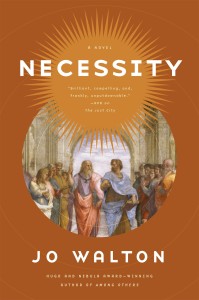Necessity was published by Tor on 12th July 2016. It is the third and final volume of the Thessaly trilogy. It is set forty years after the events of The Philosopher Kings. It’s also available as an audiobook from Audible, narrated by Noah Michael Levine.
I wrote it between 24th June 2014 and 16th May 2015 in 31 writing days, and revised it extensively between May and December 2015.
It’s almost impossible to say anything at all about it without spoilers for the other books. Read them first, eh?
Tor’s cover copy:
More than sixty-five years ago, Pallas Athena founded the Just City on an island in the eastern Mediterranean, placing it centuries before the Trojan War, populating it with teachers and children from throughout human history, and committing it to building a society based on the principles of Plato’s Republic. Among the City’s children was Pytheas, secretly the god Apollo in human form.
Sixty years ago, the Just City schismed into five cities, each devoted to a different version of the original vision.
Forty years ago, the five cities managed to bring their squabbles to a close. But in consequence of their struggle, their existence finally came to the attention of Zeus, who can’t allow them to remain in deep antiquity, changing the course of human history. Convinced by Apollo to spare the Cities, Zeus instead moved everything on the island to the planet Plato, circling its own distant sun.
Now, more than a generation has passed. The Cities are flourishing on Plato, and even trading with multiple alien species. Then, on the same day, two things happen. Pytheas dies as a human, returning immediately as Apollo in his full glory. And there’s suddenly a human ship in orbit around Plato — a ship from Earth.
Goodreads page for Necessity.
A trilogy which began as an almost-dry intellectual exercise ends as a glorious kitchen sink of genre, combining philosophy, time travel, aliens, and the gods. … Engaging food for thought.
Booklist starred review:
As before, Walton has done a superb job of world building and character development, giving readers a novel that both stimulates and satisfies.
There’s more substance here than in many actual philosophy books.
It’s probably safe to say if Jo Walton hadn’t written Necessity and its two preceding volumes, nothing even remotely similar would exist. And that would be a terrible shame.




